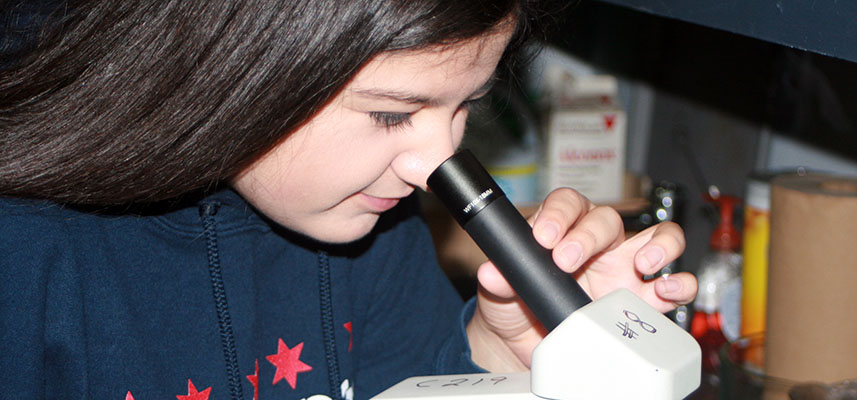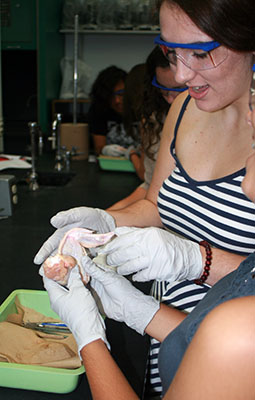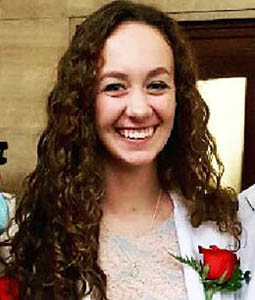NCH and Rolling Meadows High School student medical program approaches 20-year mark
December 14, 2017

Maria Luna (above), Experiential Medical Chemistry class student, looks at tissue samples of epithelial cells as a laboratory assignment.
Kathy Connolly, a Rolling Meadows High School teacher and former Northwest Community Hospital (NCH) Medical Lab Technician, is grateful to NCH for a nearly 20-year partnership that continues to offer students the single most competitive program at the school: Experiential Medical Chemistry.

This challenging senior course is heralded as a coveted spot for students planning to pursue a medical degree.
“This is an extremely advanced program right from the start,” Connolly says. “We usually have around 50 qualified kids apply but only have 20 spots. Similar to applying for a college medical program, these students have to write a letter of intent, have good grades, get letters of recommendation, and most important, have excellent attendance.”
Students are given the opportunity to shadow medical professionals on the NCH campus in radiology, lab and testing, cardiac cath lab, diagnostics, cancer services, radiation therapy, gastroenterology, nursery, oncology hospice, post op nursing, day surgery and pharmacy.
“These kids come to class with a thought as to what they would like to do professionally, but when they complete this course they realize there are many more choices in healthcare—and that’s important,” Connolly says.
To be eligible for the program, aside from required science courses, students need to pass Connolly’s human physiology class which she treats like an advanced placement course.
“I’m considered one of the toughest teachers in school,” Connolly says.
When Connolly was approached to spearhead the Experiential Medical Chemistry program, she was clear on her intention. She wanted it to prepare students for success in college and felt that teaching human physiology any other way would be a disservice. By definition, experiential means: involving or based on experience and observation.
“This course is designed to give students an understanding of the whole hospital,” she adds.

Many bright minds have moved through the ranks of Connolly’s class.
“I now have past students of this program who are nurses at NCH, and sometimes they are the people that my kids are shadowing,” she says.
Connolly’s reward over the years has been receiving emails from past students who say the course made a real difference. Grateful student letters continue to fill her inbox.
“It may be that I helped a student learn how to study better,” says Connolly. “Or maybe I gave them the confidence to believe that they could handle anything.”
Former student Robin Olson writes, “I just wanted to tell you about all that’s happening at Loyola so far. I had my first anatomy and physiology test last week and I got a 90 percent! My class moves so fast but it makes me realize how helpful your class was.”
Connolly will be retiring at the end of this school year but says she will still be around to make sure that the transition for next year’s program goes smoothly.
Besides the Experiential Medical Chemistry program, NCH also engages with youth through its Volunteer Services Program. To volunteer, contact Stephanie Chan Vo, Director of Guest Services at 847-618-4455.